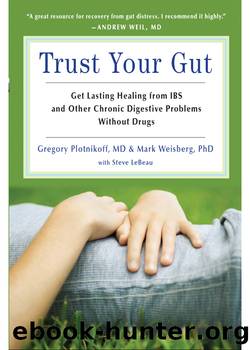Trust Your Gut by Gregory Plotnikoff

Author:Gregory Plotnikoff
Language: eng
Format: epub
ISBN: 9781609257712
Publisher: Red Wheel Weiser
Introduction to the MicrobiomeââWe Are Not Aloneâ
You have already become acquainted with two of the main players in our internal ecology: the digestive tract (stomach and intestines) and the intestinal (enteric) nervous systemâthe second brain. The third major player, called the microbiome, almost qualifies as a third brain, given its autonomy and ability to affect our well-being. Together, this inner ecosystem has power over our metabolism, mood, energy, immune system, and more. Although this third entity operates as a system, it is not a single thing but a colony within us of some 10 to 100 trillion bacteria along with lesser numbers of viruses and fungi. That's between ten and one hundred times as many microbes as there are human cells in our body. As we previously mentioned, the microbes are much smaller than our human cells and weigh in total less than five pounds.
The study of our microbiome is at the cutting edge of scientific discovery. The greatest concentration of bacteria is in our gutâprimarily in our large intestineâwhere several pounds of bacteria dwell. Because most of us were raised thinking that bacteria are the enemy, two questions may come to mind: What the heck are these organisms doing in us? And why don't we just kill them?
The answer is that not all bacteria are bad. On the contrary, our life depends upon these bacteria. We need these organisms for our own digestion, immune function, mood, and overall wellnessâincluding gut wellness. If we kill even some of them, it throws off our inner ecology. This happens all the time when we take antibiotics and other interventions. Sometimes our body can recover easily, but sometimes it can't. Disrupt the ecology enough andâwhoopsâsuffering may follow.
Instead of fighting bacteria, we need to work with them and support those that will help us as best we can. If we care for them, they will care for us. When they are happy, we are happy. Not surprisingly, the opposite is also true. When we get stressed out, the harmonious ecology is disrupted, which can result inâyou guessed itâintestinal distress. Additionally, many opportunistic bacteria have special stress sensors that turn on their genes for disease-causing powers only when people are most stressed and most vulnerable. In other words, any of the five forms of stress can increase our vulnerability to illness. More than anyone else, gut sufferers need to be on the friendly side of the trillions of germs in our gut.
Download
This site does not store any files on its server. We only index and link to content provided by other sites. Please contact the content providers to delete copyright contents if any and email us, we'll remove relevant links or contents immediately.
Men In Love by Nancy Friday(5225)
Everything Happens for a Reason by Kate Bowler(4729)
The Immortal Life of Henrietta Lacks by Rebecca Skloot(4570)
Why We Sleep by Matthew Walker(4426)
The Sports Rules Book by Human Kinetics(4376)
Not a Diet Book by James Smith(3405)
The Emperor of All Maladies: A Biography of Cancer by Siddhartha Mukherjee(3137)
Sapiens and Homo Deus by Yuval Noah Harari(3057)
Day by Elie Wiesel(2777)
Angels in America by Tony Kushner(2641)
A Burst of Light by Audre Lorde(2588)
Endless Forms Most Beautiful by Sean B. Carroll(2466)
Hashimoto's Protocol by Izabella Wentz PharmD(2365)
Dirty Genes by Ben Lynch(2310)
Reservoir 13 by Jon McGregor(2292)
Wonder by R J Palacio(2201)
And the Band Played On by Randy Shilts(2183)
The Immune System Recovery Plan by Susan Blum(2051)
Stretching to Stay Young by Jessica Matthews(2023)
